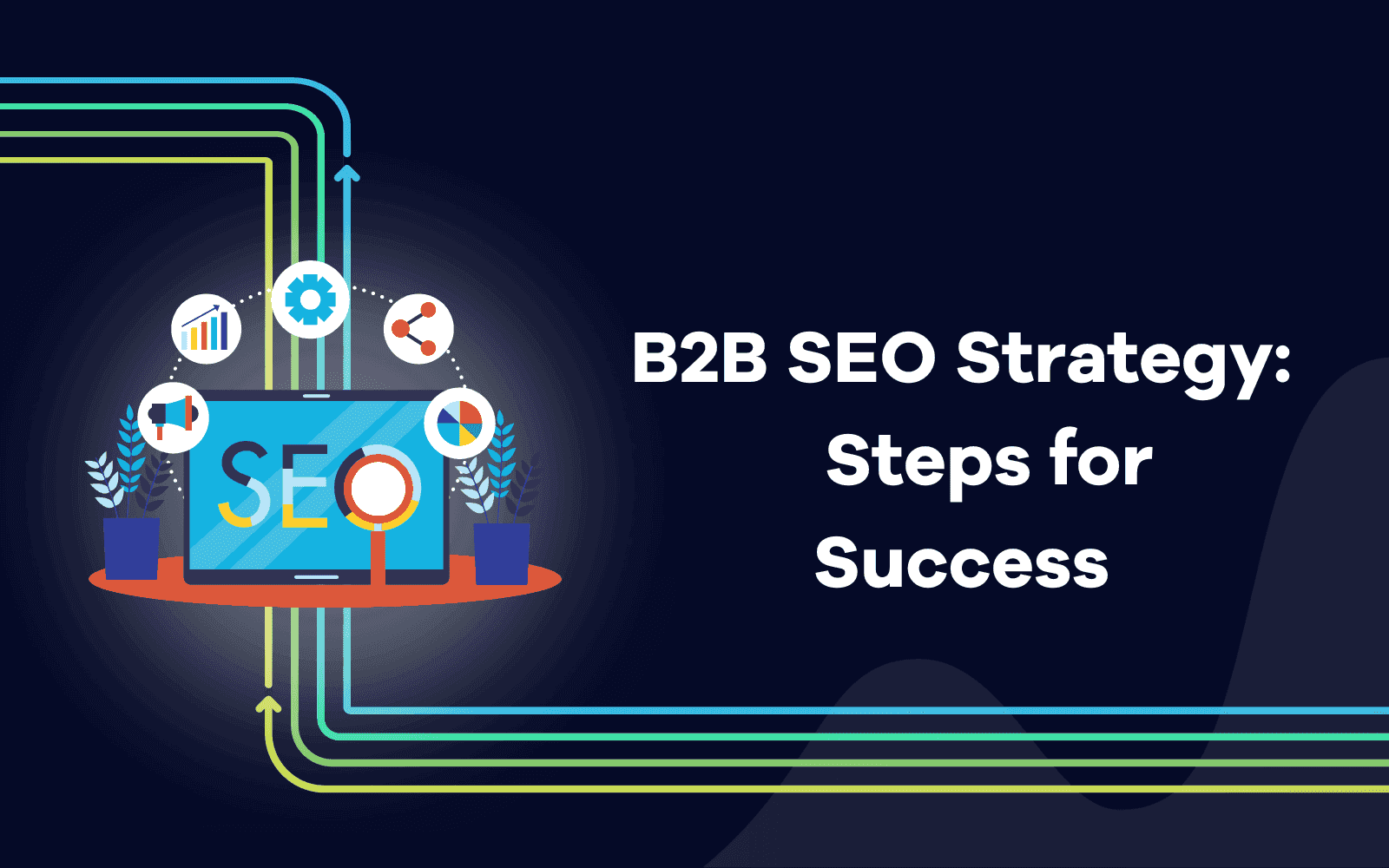Organic search continues to be an important marketing channel for B2B organizations seeking to target pertinent non-branded search queries and uphold their brand image.
This article shows insights into the distinctions in SEO strategies for B2B companies and presents strategies to assist you in achieving success through B2B SEO.

What is B2B SEO?
B2B SEO, or Business-to-Business Search Engine Optimization, is a digital marketing strategy specifically tailored to help businesses that primarily sell their products or services to other businesses (B2B customers) improve their online visibility and organic search rankings. B2B SEO aims to enhance a company’s online presence in search engine results when potential business customers are searching for relevant products or services.
B2B SEO serves as a marketing approach used to enhance the organic search presence of businesses that cater to other businesses. For many B2B enterprises, organic search is seen as a means to establish their brand and boost sales.
Integrating SEO, B2B firms craft and position content that aligns with the pertinent search keywords and intentions of their target audience.
What sets B2B SEO apart from other SEO approaches?
B2B SEO diverges from its B2C counterpart in various respects.
- Target keywords tend to feature lower search volumes, longer-tail phrases, and a greater infusion of industry-specific terminology compared to those used by B2C companies.
- Instead of focusing on individual searchers, B2B SEO aims to capture the attention of a group known as the ‘buying committee,’ comprising individuals with the authority to make purchasing decisions.
- The sales cycle in B2B is notably more protracted and challenging to quantify when compared to B2C.
B2B SEO Strategies That Drive Organic Search Success
Considering these distinctions, here are recommendations to assist you in achieving success through B2B SEO. These insights draw from over a decade of experience in the B2B sector, emphasizing the use of organic search marketing to generate revenue. These tips are universally applicable, catering to organizations of all sizes, whether they operate on the agency side or the client side.
Create an ideal customer profile
To determine the keywords you want to rank for in organic search, it’s essential to start by understanding your target audience. One effective method for gaining this understanding is by creating an Ideal Customer Profile (ICP).
The ICP process involves identifying key characteristics shared by your top existing customers. These characteristics are then distilled into a profile that outlines the ideal customer for your business. Once you have a clear picture of your ideal customer, you can more effectively conduct research to pinpoint keywords that resonate with the search interests and intent of your ICP.
Depending on the scale and diversity of your business, you may require multiple ICPs. For instance, businesses operating across different industries may need a distinct ICP for each market segment.
ICPs encompass a range of key traits, which can vary depending on your company’s products or services. However, some common traits include annual revenue, employee count, industry, geographic location, expected sales cycle length, and key buyer personas.
The buyer personas within ICPs provide insight into the individuals comprising the buying committee and end-users of your company’s offerings. These personas should outline the specific challenges these individuals face that your product or service can address. These pain points are invaluable for keyword research and content ideation, helping you create content that resonates with searchers based on their business needs.
ICPs are also leveraged by practitioners of account-based marketing (ABM) as a foundational strategy. Additionally, ICPs can give your SEO program a competitive edge.
Ultimately, ICPs help your organization to target search demand effectively, attracting the most promising prospects and, in turn, maximizing revenue potential.
Create content for the entire buying committee
Many B2B marketers often focus their marketing efforts solely on senior leaders within organizations. However, it’s important to recognize that senior leaders typically come into play at the final stages of the buying process.
A comprehensive buying committee extends from senior leaders down to end-users, which could encompass managers, analysts, or even entry-level employees. Each member of this committee wields some degree of influence and impact on the purchasing process. Therefore, creating content that caters to the diverse needs and interests of all these committee members can significantly enhance the likelihood of your brand becoming recognized, considered, and ultimately chosen.
It’s advisable to invest in generating content that covers the entire marketing funnel and addresses the varying needs of the buying committee. CEOs and managers, for instance, approach searches differently due to their distinct perspectives and unique problem-solving requirements. Conduct thorough research to identify keywords that best align with the specific needs of these different buying committee members.”
Measure Revenue Impact
Measuring the impact of organic search traffic on revenue is an important aspect of ensuring the success of your SEO project. It’s a means of demonstrating that SEO is not an expense but an investment in future cash flow.
If you haven’t already integrated this practice, consider reaching out to your customer relationship management (CRM) and marketing automation teams to initiate the conversation. Collaborating with these teams will help your organization to gain a deeper understanding of organic search traffic and optimize it for capturing additional revenue.
The measurement of revenue impact can take various forms:
- Directly through closed-won deals originating from leads who submitted online forms after entering your site from an organic search listing.
- By assessing the contribution of organic search traffic to the sales pipeline, which signifies the potential future revenue generated by deals upon closing. This is especially important for B2B organizations with extended sales cycles that can span from 6 to 12 months.
To accurately measure the revenue impact, it’s essential to consistently review and use attribution modelling. Organic search is just one of numerous potential traffic sources, and it typically serves as one of several touchpoints in the lead-up to a purchase. Selecting an attribution model that thoughtfully recognizes the role of organic search in the customer journey is pivotal to ensuring that organic search receives the credit it deserves.
Integrate and Establish Transparent Expectations
SEO should have a significant influence on virtually every marketing and sales facet within a B2B organization.
Departments such as website management, content creation, analytics, CRM, marketing automation, paid search, business development, go-to-market strategies, executive leadership, public relations, and brand teams all either directly or indirectly engage with SEO. It’s essential to ensure that SEO is seamlessly integrated and that all these stakeholders have well-defined expectations to ensure the success of B2B SEO.
Failure to align SEO with these stakeholders can lead to misinterpretation, underutilization, misplaced blame, and even the risk of it being overlooked. Conversely, when executed effectively, SEO can enhance your website, enhance content appeal, boost brand visibility, drive relevant traffic, inform product and service nomenclature, and ultimately augment revenue.
Establishing clear SEO expectations and objectives across these diverse stakeholder groups is key to integrating SEO throughout your B2B organization. Avoid the pitfall of isolating and underinvesting in SEO.
Promote SEO awareness and understanding across your entire organization. Regularly conduct educational meetings on SEO with key stakeholders, share performance data, and explore methods to incorporate SEO into their daily workflows and procedures.
B2B SEO Success means contributing to the bottom line
To achieve success with SEO in your B2B organization, it must translate into revenue. Evaluating SEO’s effectiveness should go beyond metrics like keyword rankings, inbound links, and page speed.
Instead, SEO’s success should be assessed based on its impact on your organization’s profitability. If you aren’t putting your SEO project into a long-term, revenue-generating asset, you may be missing out on opportunities for both yourself and your organization.
Ideally, the tips outlined in this article will assist you in transforming SEO into an investment that positively influences your organization’s future cash flow.
Would you like to read more about “B2B SEO Strategies That Drive Organic Search Success” related articles? If so, we invite you to take a look at our other tech topics before you leave!
Use our Internet marketing service to help you rank on the first page of SERP.
![]()











